Keyword Research For Ecommerce
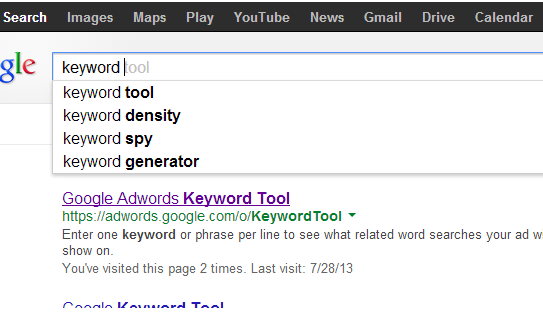
SEO.
For some online retailers it’s their main source of traffic and one of the key elements their businesses depend on. For others it’s a nuissance and hassle, yet perhaps still worth paying attention to.
As an SEO by profession I speak quite openly about the importance of not relying entirely on SEO for your traffic and income. I stand by this statement even now, while writing a post solely about search engine optimization.
However, I don’t mean that you should completely ignore SEO. It is a source of traffic after all, and quite a good one at that. It’s too unreliable to build the entire business on, yet still something you should incorporate into your marketing plan. At the very least, pages on your site should be optimized for specific keywords, ones that offer a potential to bring traffic and revenue.
The Problem with Keywords in Ecommerce
One of the biggest problems many online retailers face when it comes to keyword optimization is figuring out what keywords their potential customers might use to find and reserach the products they sell.
You could of course rely on the product name to be used as a search term. However, the problem with such approach is that customers might not use it at all or use a slight, more popular variation of the products name when conducting their search.
Sure, if you know your market well, you will now that already. However, when building a new site in a completely new market, ignoring this simple fact can mean a substantial loss of traffic for your site.
That’s why proper keyword research is crucial for any ecommerce store.
3 Steps Keyword Research Plan
To find out what keywords your potential customers might use to find your store, follow these simple steps.
Initial Keyword Research
Start by identifying keywords for further research. At this stage it doesn’t matter if those keywords receive any traffic at all or if they are converting. For now, all you need is a list of potential keywords to research further.
To compile it, do the following:
- Write Down Your Best Guesses
Simply take a guess at what those keywords might be. List all the keywords you would use to find your products or categories. Make the list as long as you can. - List all Products Within Your Niche
List names of the products you sell. It is worth researching them too. - Check Out Google Suggested Keywords
Using a software like Ubersuggest, try to compile a Google Suggested Keywords list. This is by far one of my most commonly used tools. What it does is compile a list of keywords that appear in a drop down suggest box for a particular keyword. This is an easy way to uncover plenty of commonly searched terms.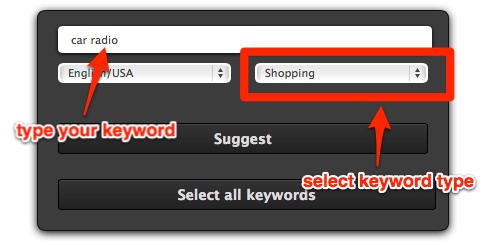
A screenshot of Ubersuggest settings panel
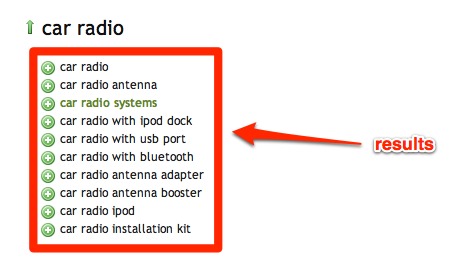
Ubersuggest results screen
- Research Your Competitor Backlinks
Using software like Open Site Explorer or MajesticSEO discover your competitors backlinks.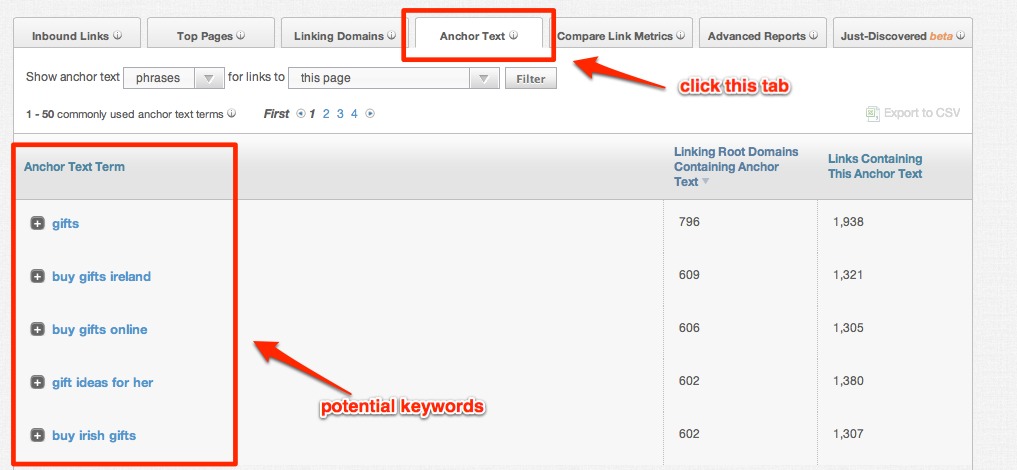
A screenshot from Open Site Explorer showing a websites Anchor Text
Most likely your competitors have been in business longer than you and thus know already which keywords are worth pursuing. Using the aforementioned programs you can sniff out those keywords from them.
What you want to look out is what anchor text they optimize their links for.
Weed Out Low Revenue Keywords
Once you have your, most likely massive list of keywords, it’s time to look at them to see which ones offer the highest potential for bringing in revenue.
There is a number of tools you can use for that. My preferred one is to use Google Keyword Planner. I know there are more sophisticated software packages on the market but for basic research the Google’s tool will be enough.
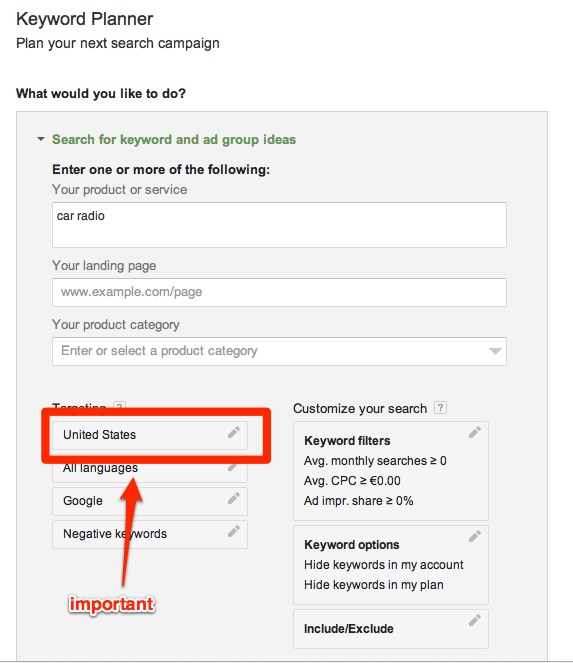
Step 1: Insert keywords you want to analyze.
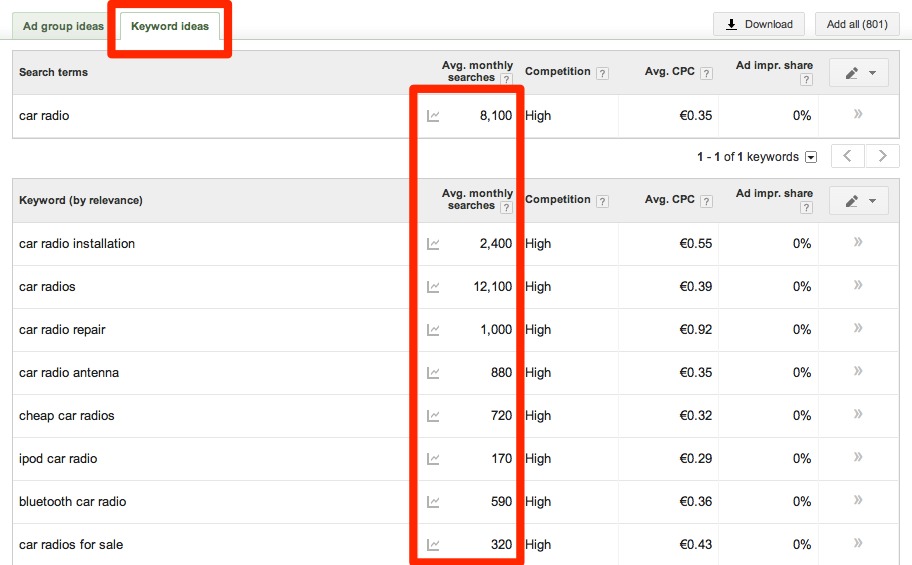
Step 2: Analyze results (note that the tool also show suggested keywords)
To check your keywords, simply paste them into the tool and let it analyze them for you. The information you are looking for there include:
- Search volume
- Competition
- PPC Cost
(The reason I am including PPC cos heret is that it is a very good indicator of the keywords potential. If companies are willing to bid big money per click for the keyword, it means that it most likely offers a good return on that investment.)
Other stats to look for per keyword include:
- Relevance – How relevant the keyword is to what you are selling
- Conversion rate – if you have any historic data, check if you got any conversion per that keyword previously.
- Current ranking – where your site is ranking right now per such keyword. Best tool to track rankings: SERPs
Map Keywords To Pages
Once you know what keywords you want to target it’s time to match them to pages on your site. You do this to know which pages should rank for which keywords.
It is quite common that a page that ranks for a keyword isn’t necessarily the one you would like to. There could be many reasons for that but on-page optimization is probably the key factor. Mapping keywords to pages will allow you to quickly establish if the right page is ranking for a specific search term and if not, to quickly correct that by improving the optimization of the said page.
Also, when it comes to keywords for which you have no category or product page to match with, make a separate list of them. Even though there is no page to match them with, they still offer a traffic and income opportunity and thus it might be worth to either create separate pages for them or try to include them on other pages.
Conclusion
Keywords research might seem like a nuisance and a waste of time, especially since you could set your Ecommerce platform to automatically pick up a product name or category to use for meta tags for instance. In reality however, you might be losing out on a lot of potential traffic that might be using more specific search terms to find the products you are selling.
Even a basic keyword research might quickly reveal them to you and help you improve your sites optimization.
Your Turn
How often do you research new keywords for your store?
Tagged SEO








